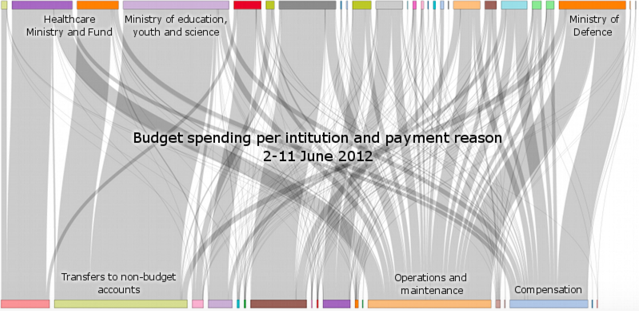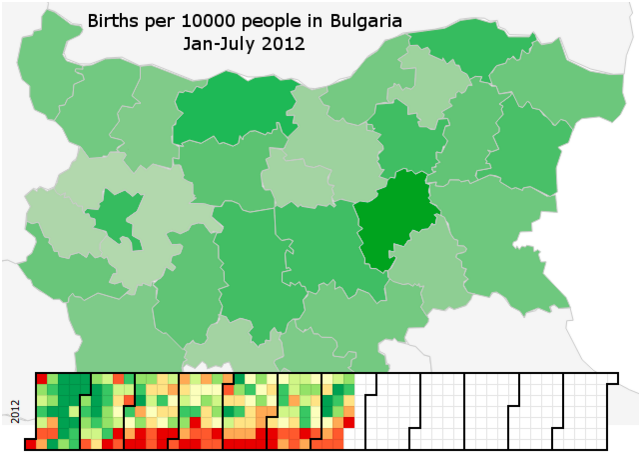Bulgaria shows progress on open governance commitments
A month ago the Bulgarian cabinet voted in a 33 point action plan for achieving open governance. The main goals of this plan are financial transparency, public registry improvement, public consultation and corporate social responsibility. One of the most important measures is publishing daily budget spending reports with a breakdown of payment reason and target. This measure was executed right away by the finance ministry. All ministries should follow suit as of August.
Here is an example of how those data can be used to understand public spending:
Other measures to tighten fiscal discipline are opening data on discrepancies in financial auditsInstitutional and legal frameworks are necessary for providing assurance of the integrity of financial information and of compliance with budgetary rules and procedure. Technical specifications: These... of companies and improving regulationGovernment reformers are developing regulations that enshrine values of transparency, participation, and accountability in government practices. Technical specifications: Act of creating or reforming ... and transparencyAccording to OGP’s Articles of Governance, transparency occurs when “government-held information (including on activities and decisions) is open, comprehensive, timely, freely available to the pub... More in NGO funding.
Although Bulgaria boasts a well-written freedom of information act, there’s still room for improvement. That’s why the cabinet will amend it to improve transparency. There’s not much details given in the plan, but preliminary talks point to the inclusionOGP participating governments are working to create governments that truly serve all people. Commitments in this area may address persons with disabilities, women and girls, lesbian, gay, bisexual, tr... More of open dataBy opening up data and making it sharable and reusable, governments can enable informed debate, better decision making, and the development of innovative new services. Technical specifications: Polici... as a requirement in new information systems and processes.
An electronic health care system that links all health centers is being developed as well. It will have built-in capability to access statistics about hospitals, doctors and audits. It may also be possible to track spreading of diseases while still protecting the privacy of patents. The first step is there – an open registry with near real-time birth data has been active since January 2012. This will allow citizens and businesses to extrapolate data for their own use, with graphs such as this one:
Another registry mentioned in the plan includes geographic, quantitative and qualitative data on natural resources, companies allowed to exploit them and audits of their activity.
A big part of the plan is corporate social responsibility and dialogue. Although technically the government can’t regulate this process, the action planAction plans are at the core of a government’s participation in OGP. They are the product of a co-creation process in which government and civil society jointly develop commitments to open governmen... includes measures for stimulating businesses to be more open and transparent, for improving dialogue related to legislationCreating and passing legislation is one of the most effective ways of ensuring open government reforms have long-lasting effects on government practices. Technical specifications: Act of creating or r... and regulation both at local and national level and finally – for developing best practices for social responsibility that are better suited for Bulgaria.
For the past month the cabinet has been working on a detailed documentation assigning responsibilities and goals to each of these 33 measures. Such details will help the public track and demand progress regardless of changes in government. Nevertheless, there’s still a big gap in the plan – namely, how to ensure sustainability of open governance in Bulgaria. The experience of other countries shows that if public servants don’t understand the benefits of open data and are not free to suggest and publish resources, we will end up with a limited number of fragmented datasets with diminishing quality. Rooting the concept of openness not only in information systems, but also in administration reform and day-to-day operations is the only way to ensure a lasting effect.
Still, it’s safe to say that Bulgaria is taking important steps toward a truly open government – one that will surely be irreversible. Progressive journalists and active citizens will ensure that this plan will not be a one-time deal, but the beginning of a lasting process.
For more information on opengov in Bulgaria:
http://bg.okfn.org/ – the Bulgarian language blog of OKFN
http://opendata.yurukov.net/ – resources that me and other opendata activists maintain. Within two weeks they will publish 300,000 scraped court decisions with full text and metadata.
http://lists.okfn.org/pipermail/okfn-bg/ – opendata mailing list in Bulgarian


